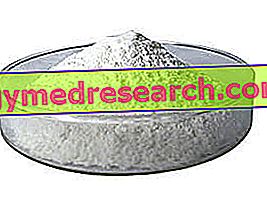The eyes, like all other organs, also benefit from the foods and vitamins they contain.
Vitamin A
Vitamin A and its precursors (in particular beta carotene) are involved in the mechanism of crepuscular and diurnal vision. Consequently, vitamin A deficiency leads to a deficit in night vision and xerophthalmia (dry eyes and blindness caused by opacification of the cornea). This explains why this very important vitamin is the essential ingredient for eye health.

A deficiency of vitamin A could cause serious consequences for eyesight: eye fatigue, sensitivity to light, dry eyelids, decreased immune defenses with increased predisposition to infections, ulcerations and, in cases of higher severity, irreversible blindness. It should be remembered, however, that vitamin A deficiencies are unlikely, considering that nature offers a wealth of foods rich in this vitamin: in addition to carrots, even pumpkin, milk, eggs, liver and animal foods in general, are sources of vitamin A. For example, half a carrot is enough to satisfy the daily requirement of vitamin A for the body.
As we have seen, carotenoids are pigments that paint vegetables with the typical bright colors: among the carotenoids stand out lutein and zeaxanthin, two substances that prevent the onset of diseases affecting the eyes. Lutein is known for its anti-radical and protective properties of sight: it is found above all in spinach, in lettuce, in peas and in cabbage. Zeaxanthin, on the other hand, is present in peppers, corn, egg yolk, mango and spinach: its deficiency could cause blindness in the elderly.
Vitamin B2 and C
Vitamin B2 is also closely linked to the proper functioning of vision and maintenance of eye health: its deficiency, in fact, could cause burning, sensitivity to light, itching, tearing, up to paralysis of the eye muscles. This vitamin is found in the liver, cereals, yeast and eggs.
Vitamin C also plays an essential role in eye health. Being the antioxidant par excellence, together with vitamin E, ascorbic acid protects the body from the attack of free radicals. For this reason, vitamin C could be a valid aid in the prevention of some eye degenerative diseases. Vitamin C is useful in the treatment of glaucoma and could counteract the progressive loss of vision, avoiding "hardening" of the eye. It is also used in the prevention of corneal ulcers and is useful in eliminating infections. It is omnipresent in vegetables, in particular it is found in lemon, in citrus fruits in general, in broad-leaved vegetables, strawberries, peppers, tomatoes and cauliflower.
Vitamin E
Also vitamin E, or tocopherol, has antioxidant potential: for this reason it could be useful for the prevention of eye disorders such as cataracts and AMD (macular degeneration of adulthood). Vitamin E could decrease the severity of the acute phase of reticular fibroplasia (severe alteration of the visual structures behind the crystalline lens, which often leads to blindness); moreover, vitamin E has brought positive results also in strengthening the eye muscles and in preventing blurred vision. Its deficiency could be a contributory cause in the retinal detachment. Vitamin E is found in foods such as cereals, almonds, corn oil, wheat germ oil and hazelnuts.
Just as the body benefits from a correct diet, the contribution of a good quantity of vitamins is also indispensable for the health of the eyes: in this article the eye disorders linked to vitamin deficiencies have been treated. It should be remembered that even an excessive intake of vitamins can cause various visual disturbances. For example, excessive vitamin D supplementation could cause calcification of the conjunctiva and cornea.
Conclusions
From the most ancient legends, it is said that the eyes are the mirror of the soul : natural medicine completes the proverb, stating that the eye also represents the mirror of the body, of health and of the diseases associated with it.



